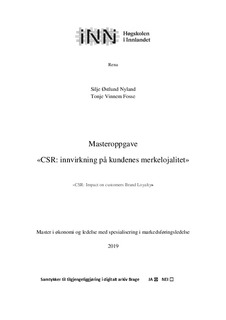| dc.contributor.author | Østlund Nyland, Silje | |
| dc.contributor.author | Vinnem Fosse, Tonje | |
| dc.date.accessioned | 2020-02-06T14:23:28Z | |
| dc.date.available | 2020-02-06T14:23:28Z | |
| dc.date.issued | 2019 | |
| dc.identifier.uri | http://hdl.handle.net/11250/2640090 | |
| dc.description | Dybdebasert master, 120 studiepoeng. Spesialisering markedsføringsledelse. | nb_NO |
| dc.description.abstract | Hensikt - Denne studien har som hensikt å utforske om word of mouth og intensjon om gjenkjøp blir påvirket ved kommunikasjon av miljøaspektet og samfunnsaspektet. Design/metode/tilnærming - Det er benyttet kvantitativ tilnærming, med testing av fire hypoteser. Ved bruk av elektronisk og anonymisert spørreundersøkelse, ble det hentet inn svar fra 173 respondenter. Påstandene er operasjonalisert på bakgrunn av det teoretiske rammeverket. Respondentene er brukere på sosiale medier mellom 18 og 35 år. Funn - Alle fire hypotesene er empirisk testet. Basert på funnene i analysen, er indikatorene word of mouth og intensjon om gjenkjøp slått sammen til merkelojalitet. Forskningsmodellen ble justert til to hypoteser. Funnene tyder på at kommunikasjon av miljøaspektet har en sterkere innvirkning på merkelojalitet, enn hva samfunnsaspektet har. Både miljøaspektet og samfunnsaspektet har en signifikant positiv innvirkning på merkelojalitet. Begrensninger/implikasjoner - Utvalgsstørrelsen er liten og begrenset til brukere på sosiale medier mellom 18-35 år. Ingen kontrollvariabler er inkludert og indikatorene for word of mouth og intensjon om gjenkjøp er slått sammen til merkelojalitet. Fremtidige studier bør utvide målgruppen og øke utvalgsstørrelsen, inkludere kontrollvariabel og spesifisere dimensjoner ved merkelojalitet. Praktiske implikasjoner - Funnene gir ny innsikt i viktigheten med å utvikle gode kommunikasjonsstrategier vedrørende miljøaspektet og samfunnsaspektet. Basert på dette kan kundenes engasjement til merket være med å øke merkelojaliteten. Bedrifter må være oppmerksomme på at det kan være andre påvirkningsvariabler som kan innvirke på denne sammenhengen. Originalitet/verdi - Dette er en av få studier som tester hvordan miljøaspektet og samfunnsaspektet separat innvirker på merkelojalitet. Tidligere studie av Park og Kim (2016) undersøkte dette, men i en kontekst av “fast fashion”. Andre studier har målt aspektene sammen, og ikke separat (Dawkins, 2005; Moon et al., 2015). Dette vil dermed tilføre ny og utvidet kunnskap til allerede eksisterende litteratur innenfor samfunnsansvar. | nb_NO |
| dc.description.abstract | Abstract (Engelsk sammendrag)
Purpose - This study aims to examine the correlations between communication of environmental issues and society issues on customers word of mouth and re-buying intentions. Design/methodology/approach - A quantitative approach is adopted, testing four hypotheses. By using an electronic anonymous questionnaire, data from 173 respondents were collected. Operationalization of the questions were based on a theoretical framework. The respondents are social media users between 18 and 35 years old. Findings - All four hypotheses are empirically tested. Based on the findings in the analysis the indicators used to measure word of mouth and re-purchase behaviour were converted into brand loyalty. The research model was adjusted to two hypotheses. This study finds that communication of environmental issues is a stronger predictor for brand loyalty than society issues. Both environmental issues and society issues have a significant positive impact on brand loyalty. Research limitations/implications - The sample size was small and limited to social media users between 18-35 years old. No control variables were included and the indicators word of mouth and re-purchase behaviour were converted to one dimension. Future studies should expand the target audience and increase the sample size, include control variables and specific dimensions of brand loyalty. Practical implications - The findings provide new insight for the importance of developing a good communication strategy regarding environmental issues and society issues. Based on this the customers engagement with the brand can increase their brand loyalty. Companies need to be aware of a possible impact of other variables regarding this connection. Originality/value - This study responds to the need of research where environmental issues and society issues are measured separately up against brand loyalty. Previous study of Park and Kim (2016) examined this, but in a context of fast fashion. Other studies have measured the aspects together and not separately (Dawkins, 2005; Moon et al., 2015). Overall, the findings of current study provide new and expanded knowledge on already existing literature within corporate social responsibility. | nb_NO |
| dc.language.iso | nob | nb_NO |
| dc.subject | Quantitative Method | nb_NO |
| dc.subject | kvantitativ metode | nb_NO |
| dc.subject | Word Of Mouth | nb_NO |
| dc.subject | kommunikasjon | nb_NO |
| dc.subject | Communication | nb_NO |
| dc.subject | merkelojalitet | nb_NO |
| dc.subject | Brand Loyalty | nb_NO |
| dc.subject | samfunnsansvar | nb_NO |
| dc.subject | CSR | nb_NO |
| dc.title | «CSR: innvirkning på kundenes merkelojalitet» | nb_NO |
| dc.title.alternative | «CSR: Impact on customers Brand Loyalty» | nb_NO |
| dc.type | Master thesis | nb_NO |
| dc.subject.nsi | VDP::Samfunnsvitenskap: 200::Økonomi: 210::Bedriftsøkonomi: 213 | nb_NO |
| dc.source.pagenumber | 93 | nb_NO |
